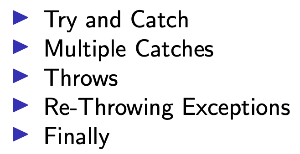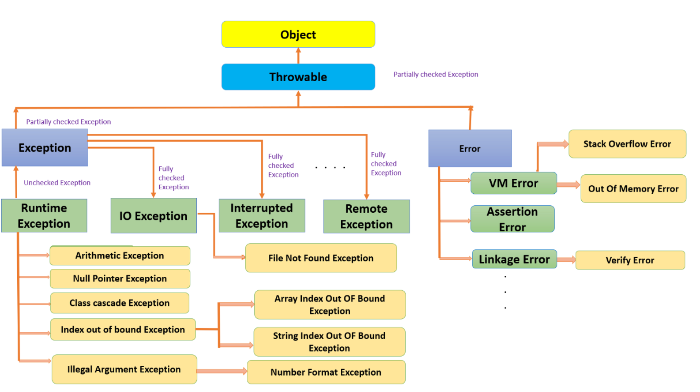Code&Data Insights
[Java Programming] Exception Handling (Checked Exception | Unchecked Exception) 본문
[Java Programming] Exception Handling (Checked Exception | Unchecked Exception)
paka_corn 2022. 7. 24. 09:48[ Exception ]
- Exception(예외)란 프로그램이 핸들링 할 수 있는 오류를 말한다.
- When something does not go as planned (프로그램이 원하는 방향으로 작동하지 않을때 사용)
- Exception(예외처리) 하는 방법 :

- 오류, 그 중 런타임 에러는 Error와 Exception으로 나뉜다.
=> 오류의 경우 컴파일에러/런타임에러/논리적에러로 나뉜다. 예외처리를 할 수 있는 에러는 런타임에러, 그 중에서 exception만이 가능하다.
=> Error의 경우에는 예외처리가 불가능하다.
=> (ex) OutOfMemory와 같은 심각한 에러는 예외처리로 다룰 수 없다

- Exception의 종류 : checked / unchecked exception
[ Checked Exception ]
- 예외 처리 필수 , 컴파일러가 예외처리 여부를 체크
=> A method must declare that it might throw an exception
=> 반드시! try-catch문을 사용해서 예외를 처리해줘야 한다.
- Most Exceptions are checked ( 대부분의 예외는 checked 예외이다. )
- Exception과 Exception class(base class) 의 child class(derived class).
- Compile time에 발생한다.
=> IDE(Eclipse, IntelliJ)와 같은 통합개발환경 tool이 Complie시에 체크를 해준다.
- 주로 사용자의 실수로 발생
- (ex) IOException, SQLException
[ Unchecked Exception ]
- 예외 처리 선택 , 컴파일러가 예외 처리 여부를 체크 안함
=> try-catch문을 쓰지 않고도 컴파일이 가능하다.
- RuntimeException과 RuntimeException(base class)의 child class(derived class).
- runtime(실행 시) 발생 한다.
- 주로 개발자의 실수로 발생
- (ex) ArrayIndexOutOfBound, ArithmeticException, NullpointException
[ Exception Handling ]
- 예외를 처리하는 방법에는 try-catch문을 이용해 직접 처리하거나, 예외 선언(떠넘기기)가 있다.
< Try-Catch >
: the basic way we use exceptions is by wrapping code in try-catch blocks
( try-catch문 안으로 코드를 넣어 예외처리하는 가장 기본적인 방법 )
< 예외를 선언하는 방법 >
: 메서드가 호출시 발생가능한 예외를 호출하는 쪽에 알리는 것.
- throws와 throw
throws : Exception Handling을 다루기 위해 사용
=> methods can declare that they throw exceptions (예외를 메서드에 선언)
=> methods have to declare thrown checked exceptions
=> Always try to be specific, don't just throw Exception
throw : '예외 상황'을 발생시키고자 할 때
=> Create an exception instance
'Computer Science > Java Programming' 카테고리의 다른 글
| [ Java Programming ] Static 개념 끝내기 ( Variables & Static Methods ) (0) | 2022.07.18 |
|---|---|
| [ Java Programming ] StringBuffer class & StringBuilder class (1) | 2022.06.15 |
| [ Java Programming ] Interface와 Abstract의 차이점 (0) | 2022.06.09 |
| [ Java Programming ] LinkedList / LinkedList vs ArrayList (0) | 2022.06.02 |
| [ Java Programming ] Recursion (2) | 2022.04.19 |


